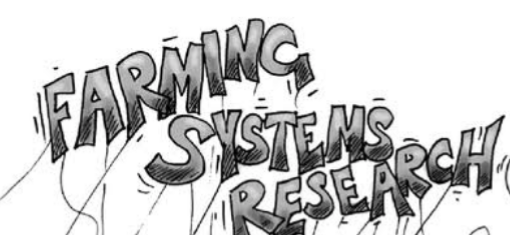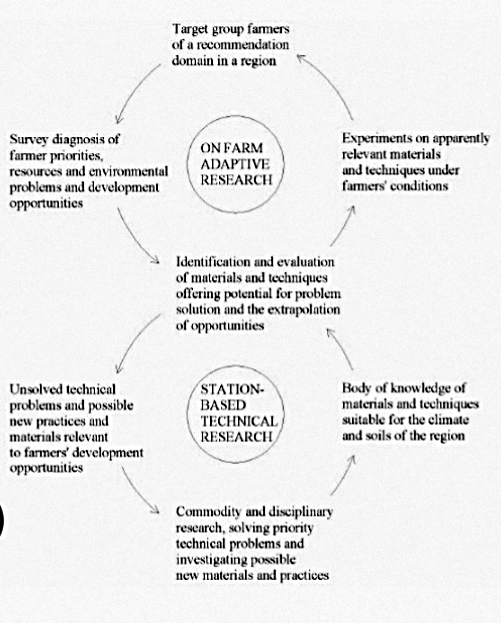
Farming System Research (FRS) is a multidisciplinary whole farm arrangement developed some years ago to solve the problems of small scale and marginal farmers who constitute over 80% of farming communities most especially in developing countries. These small scale farmers were observed to be operating under harsh environmental conditions and were not benefiting from the conventional agricultural research and extension strategies. Also, under the gradual shrinking of land holding, it is necessary to integrate land – based enterprises like fishery, poultry, duckery, apiary, field and horticultural crops etc within the biophysical and socio ecological environment of the farmer so that farming can be made profitable and dependable.
No single farm Enterprise is likely to be able to sustain the small and marginal farmers without resorting to integrated farming system (IFS) for the generation of adequate income, and gainful employment inorder to find solutions to the problems of the small scale and marginal. farmers. Therefore, farming system research was developed.
DEFINATION OF FARMING SYSTEM RESEARCH.
Farming System Research (FRS) can be defined as an approach that seek practical and relevant solutions to the complex production and environmental problems facing small scale and marginal farmers.
In the broadest sense, Farming System Research (FRS) is any research that views the farm in a holistic manner and considers interactions (between components and of components with the environment) in the system (Mahapatra and Behera, 2011;
From: Advances in Agronomy, 2023
It is a multi-disciplinary approach to agricultural research for improvement in productivity, profitability, employment and income generation. It emerged as a way to provide solution to problems that cannot be addressed by conventional discipline oriented analysis but through multi disciplinary approach. Both the researchers and farmers are involved in the process of research. They work hand in hand to diagnose constraints faced by smallholder farmers and to develop appropriate and improved technologies needed to solve their agricultural problems.
OBJECTIVE OF FARMING SYSTEM RESEARCH
1. Development of relevant and viable technology for the small scale farmers who has the full knowledge of existing local farming system
2. Evaluation of technology not only in terms of its technical performance but in terms of its conformity to the goal, needs and socio-economic circumstances of the small scale farming communities with special reference to profitability and employment generation
3. Making the farming household self sufficient and the farm itself free from external forces
4. Developing farming Enterprise for improve income, employment, natural resources environment and diet of farm families with simultaneous minimization of risk
5. Improve inter-action between the components groups and component groups and their environment.
STRUCTURE AND COVERAGE OF FSR
FSR embrace among others, farming components like soil, labour, capital, research, energy, education as well as the farm families/target group of farmers who farm the central managers of agricultural and related activities
It is an inter-disciplinary research process involving:
1. Participant of experts with various agricultural fields (Agronomist, Agricultural economists, Animal scientists etc) working together as an on-farm research team
2. The Identification of dictate target group of farmers operating the same system in fairly homogeneous circumstances (problems, opportunities and technologies)
ROLES OF THE MULTIDISCIPLINARY TEAMS
1. FARMERS : The farmers participate in the research process by helping in the identification of the research problems as well as take part in testing the possible solution.
2. RESEARCHER: These are the experts or professionals in various field of Agriculture who work together to carry out findings and solve farmers problems
3. EXTENSION AGENTS: They collect problems encountered by farmers from the field to the researchers and disseminate new technologies to the farmers on the field. etc
THE CHARACTERISTICS OF FARMING SYSTEM RESEARCH
1. It is holistic or system oriented,
2. It is problems solving: involvement of farmers in problem identification and solving process,
3. It is farmer participatory,
4. It envisages location specific technology solutions,
5. It is for specific client group – small/ marginal farmer,
6. It adopts bottom up approach,
7. It compasses extensive on farm activities, collaboration between farmer and scientist,
8. It is gender sensitive,
9. It ultimate objective is sustainability,
10.It focuses on actual adoption,
11.It recognizes interdependence among multiple clients.
SYSTEM METHODOLOGY OF FSR

Farming system research as a research method is designed to understand farmer’s priorities, strategies and resources allocation decisions. It is most often used in conjunction with on – farm research with multi and inter disciplinary in nature and uses a whole farm approach for improved technologies to enhance and stabilize agriculture production.
The operation of FSR has three components as follows
1. On-farm Adaptive research
2. Station experimental studies
3. Modelling and computer simulation
1) ON-FARM RESEARCH : This is the research conducted on farmers field (which are relatively large plots) with active participation of farmers.
2. STATION EXPERIMENTAL STUDIES: This is concern with experiment on farming system perspective conducted on the research station taking to consideration the farmers problems, resources available ( land, labour, capital etc) and farm constraints ( physical and bio-physical)
3.) SYSTEM MODELLING AND COMPUTER SIMULATION: modelling is an abstract representation of a real thing or system. It simulates the behaviour of the real thing or system. It serve to analyse the system and through light on the circumstances and purposes of its operations. Farming System models are useful in the following ways :
a) It helps to improve prioritisation of enterprise, better planning and designing of farming system experiment as well as farm management and policy making
b) It helps to analyse and explain the behaviour of complex system and to determine relative participation of farmers thus ensuring that technology generation through the combination of efferts of researchers and farmers will be realistic to the socio-economic environment of the farmers and the problematic situations usually encountered by the farmers.

It’s awesome to go to see this website and reading the views of all friends regarding this piece of writing, while I am also zealous of getting experience.
Supremelights is highly delighted for your response and appreciate you for your complimentary message. Please, if you have any aspect of Agriculture you want us to address whether from the post on the website or not, feel free to contact us.
Best regards.
Bye.